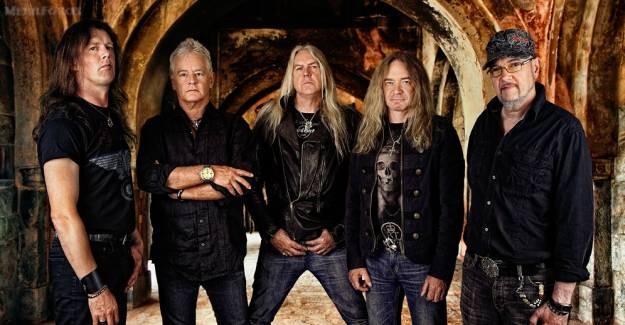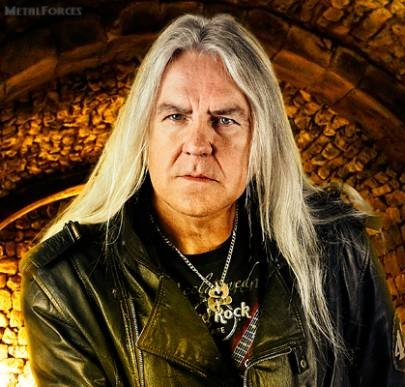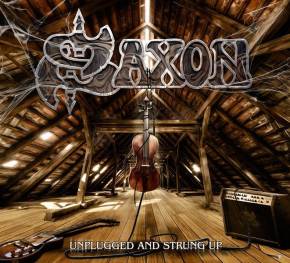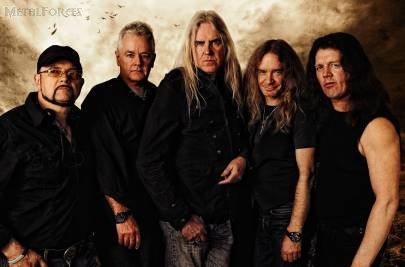
SAXON – Orchestral / Acoustic Thunder
Anthony Morgan
November 2013
 Saxon (l-r): Nibbs Carter, Nigel Glockler, Biff Byford, Doug Scarratt and Paul Quinn |
![]()
November 2013 studio compilation Unplugged And Strung Up – issued courtesy of Yorkshire, England-based heavy metallers Saxon – consists of 14 previously authored compositions, compositions the outfit have lent either a fresh arrangement, a fresh recording, or fresh mix to. The cuts in question span the depth and breadth of Saxon’s back catalogue, new arrangements including acoustic as well as orchestral interpretations.
“We’ve been messing around for about five years with acoustic tracks,” discloses Biff Byford, vocalist of Saxon. “We did an orchestrated ‘Crusader’ when we made the Lionheart album (September 2004), so it’s been around for about nine years altogether. We were gonna do another Heavy Metal Thunder edition (September 2002) – which was of re-recorded classics – but then we had an idea to do some acoustic tracks. Basically, it’s a culmination of different ideas we’ve had really. Rather than just do an acoustic album, I thought that it would be cool to do a mixture of different styles, to make it more interesting.”
Cuts orchestrally reworked include the aforementioned ‘Crusader’, ‘The Eagle Has Landed’, ‘Red Star Falling’, ‘Broken Heroes’, and ‘Call To Arms’. “I picked songs for the orchestral parts that were obviously big and epic but had a lot of space in them for the parts to fit in, really,” the frontman explains. “I think sometimes when people put orchestration or orchestras on songs, they tend to be too busy. They clash with the guitars sometimes. I think the versions that we’ve done are quite sympathetic to the tracks, so I think it works quite well.”
A somewhat remixed version of ‘Stallions Of The Highway’ inaugurates Unplugged And Strung Up. “It’s basically the same version,” Biff contends. “We just tried to get a bit more power on the sound with it, and obviously it’s me singing it now rather than singing it 35 years ago. It’s just a different twist on the song, really.”
‘Stallions Of The Highway’ aside, musical parts were generally re-recorded for the full-length compilation. “They were all re-recorded, yeah,” the singer confirms. “I think the ‘Crusader’ one is Nigel drumming, and the one on Heavy Metal Thunder is Fritz Randow drumming. A few things changed. I think the one that we maybe didn’t re-record is ‘Red Star Falling’, which I think is probably the original track. We just remixed it, if you know what I mean. I didn’t re-sing it. We just remixed it with the orchestrated parts in there, so yeah, pretty much everything is… Even ‘Requiem’ is a different version on this album than the one that we recorded for Feast (March 2013).”
As much as almost 35 years separate certain newly recorded versions from their original counterparts, a timeframe during which the human voice can diminish in power. “Pretty similar, really,” Biff submits, critiquing his 1979 voice against his 2013 voice. “Actually, I suppose there’s a little bit more depth to my voice now, but I think the high end is pretty much the same really. I suppose I’ve learnt to sing a little bit better than I did on the first Saxon album, but I still scream away at full volume, so that’s not changed (laughs).”

|
Not all fellow veteran vocalists have been so fortunate. “I think you’re probably talking more live than in the studio, aren’t you?,” the Saxon mainman queries, which is answered in the affirmative. “More singers can get it right in the studio, but yeah, I have good times and bad times. Generally though, on average I’m pretty good. I don’t have many bad days, but that’s just because I’m lucky I suppose.”
The numbers ‘Forever Free’ and ‘Just Let Me Rock’ simply appear in re-recorded fashion, the pair having originally appeared on May 1992’s Forever Free. “Forever Free was a strange album for us,” Biff remembers. “We made it in some old factory in Austria. The guy that produced it (Herwig Ursin) was a bit whacky. We’d be there all day; he used to turn up at 1am and just say ‘Let’s do it,’ but we’d been there since 10am (laughs). It was a bit strange. I thought the drum sound wasn’t great on the Forever Free album. We just fancied doing it again, really. It’s a great track. Again, I think it’s a little bit forgotten. It’s in between Solid Ball Of Rock (February 1991) and Dogs Of War (August 1995), so it’s a little bit forgotten.”
Selecting further tracks from Saxon’s catalogue to simply re-record hasn’t been altogether ruled out. “I think some of the songs off of the Destiny (June 1988) album could probably be re-recorded quite well,” the lyricist reckons. “There are a lot of keyboards on that album, quite sickly keyboards in my opinion that were put on after we recorded them. It was just a bit of a shock, really. Some keyboard sounds can make things sound very sweet, if you know what I mean, and take away the heaviness. I think it just took a little bit of the heaviness away from the guitars, really. Underneath it, there are some great songs on that album. It’d be nice to go back to that album and revisit the songs, really. We could just easily remix it if we could find the tapes, but it’s difficult to find the tapes these days. They seem to be all over the place. We’ve just had a phone call from somebody in Atlanta who has some Power & The Glory tapes (March 1983) for whatever reason, so they’re all over the place, these things (laughs). Yeah though, I think Destiny would be great. Some re-recorded tracks off that would be good.”
An outfit in Saxon’s vein exhibits raw power. Therefore, outfits in Saxon’s vein must approach musical sounds in the ilk of keyboards with caution. “That’s why the orchestrated ones on the new album sound so good, because we took great care in making sure they don’t distract from the original parts,” Biff stresses. “There’s a lot of space in ‘Crusader’ and ‘The Eagle Has Landed’ for keyboards to be fitted in, and orchestra as well. It works really well, I think.”
Of Unplugged And Strung Up’s new interpretations, ‘Frozen Rainbow’ happens to be the composer’s favourite. “That’s a one take vocal, and it just sounds great,” he enthuses. “My voice is pretty cool on that, I think. I just captured something on the day, so I was quite pleased with that one. We do have a music video for ‘Frozen Rainbow’, as well. It’s the three of us – me, Paul (Quinn, guitars) and Doug (Scarratt, guitars) – sat around with some candles and things. It’s a pretty laid back one, actually.”
Not all vocal tracks are cut in minimal takes. “Sometimes it takes a little longer,” Biff admits. “That one I did more bluesy, so it was just one of them ways that I sang it at that particular time on that particular day. I sang a different way a couple of times, but on that particular take I just sang it that way and we all liked it.”
‘Requiem’ as well as ‘Coming Home’ round out the effort’s acoustic studio renditions. “We basically used two acoustic guitars,” the vocalist informs. “There’s just a little bit of Moog pedal and a bit of bass guitar on a couple of them but they’re not electric unplugged, if you know what I mean. We took unplugged to mean unplugged, so it’s just acoustic guitars with microphones in front of them. I suppose in that respect, you’re tied down to the guitars sounding plentiful if you know what I mean, because you’ve got no effects on it. So yeah, I think we can say that they’re true, pure acoustic tracks. I think they sound great, really. I think they transpose nicely.”

|
Not all attempted acoustic interpretations experienced success. “We tried an acoustic version of ‘Princess Of The Night’, which didn’t sound very good,” Biff chuckles. “Not really, though. There weren’t too many duds, but maybe that one didn’t sound right. We haven’t been working on acoustic tracks for five years, per se. We’ve been doing different things; acoustics, some orchestration, and some re-recorded. Just to make it interesting really for people. We zeroed in on the first album and re-recorded three tracks from that, because that’s an album that’s a little bit forgotten sometimes.”
The acoustic take of ‘Iron Wheels’ is a live affair. “We liked it,” the frontman reasons. “I think it’s from Belfast, and the audience were particularly great. I think it works well. It’s always nice to have one live track, just to hear the reaction of the audience to the track. We just finished mixing Manchester from the Sacrifice tour, St. George’s Day in 2013, and that sounds fantastic as well. I have no idea where it’ll end up. We just do them basically as part of the contract. It could end up as an extra on something, or it could end up as a live album. We’ll talk about that later when we listen to it. I’ve just done a Dio song as well with Motörhead for the new Dio tribute album that’s gonna be coming out soon. It’s ‘Starstruck’ (by Rainbow, and from May 1976’s Rising). It’s one that Motörhead recorded and Lemmy couldn’t sing a couple of months ago because he was ill, and so they asked me to sing it. I think Lemmy’s playing bass; it’s the Motörhead band with me singing. It was quite nice to be asked to sing it, actually. So hey, we’re doing all sorts of stuff mate.”
Biff guested on March 2013 full-length The Mystery Of Time, the sixth full-length outing by rock opera project Avantasia, appearing on the compositions ‘Black Orchid’ and ‘The Great Mystery’. “It was great,” he compliments. “I only sung a segment of the album. It wasn’t the full orchestra version I was singing to. Tobias (Sammett, composer / vocalist) came to Brighton. I went down, and we did it in a studio down there. It was really nice, yeah. It was great.”
Unplugged And Strung Up was recorded, mixed and mastered with Andy Sneap in Derbyshire, England. “He’s great, Andy,” the singer commends. “He has a really good ear for our genre of music. He’s a big fan of ours, actually. He’s a big fan of Saxon and a lot of the 80s bands, but yeah, he was great. He mixed a few, but he did the mastering over the whole album. So yeah, he’s involved with Saxon now, and probably will be on the next album. I’ve been talking to him a bit about it, so we’ll have to see what his schedule is like.
“At the moment, the Motörhead tour’s been postponed until February. We were going into the studio in February 2014, but we’re gonna go into the studio in November now and start writing for the next album. I’d imagine the next album, you’d be looking at maybe early 2015 I would think. In 2014, we’re doing the Motörhead tour. We’re doing the second tour of America. We’re doing festivals in the summer, and we may do a 35th anniversary tour in November. We are talking about maybe doing some shows with maybe two keyboard players, and doing orchestrated versions off of the album. We’d maybe do an orchestral gig at one of the bigger festivals we headline, so we’ll keep our fingers crossed really. It’s something interesting that will happen, I think. We’ll be busy in 2014, so we’re gonna be writing in between playing really.”
Certain anniversary performances will be marked by a specially composed setlist. “The headlining shows we’re having in February around the Motörhead tour, I think we have like three to four of,” Biff shares. “They’re gonna be different, because obviously we’ve got more time when we headline. We’re gonna basically feature all of the albums up until Crusader (April 1984) in that set, because it’s Crusader’s 30th anniversary. Obviously we’re gonna play Sacrifice tracks and other things as well, but we’re gonna feature the first six albums more – tracks that we haven’t played for quite a long time.”

|
Mixing orchestral parts perhaps differs from mixing conventional heavy metal sounds. “I think so yeah, because mixing isn’t like recording, if you know what I mean,” the mainman analyses. “We mixed some of these tracks, and the other people mixed the other bits. When you’re mixing, it’s how the guy that mixes interprets it. Andy mixed the songs how he thought they should sound. Obviously some of the songs had already been mixed before, like ‘Crusader’ and ‘Call To Arms’, so he just mixed them differently. I don’t think there’s a massive difference. Mixing is just down to the levels of things, and the sounds that go on there. It’s quite difficult to mix an orchestrated track.”
Originally issued in September 2002 as a stand-alone release, Unplugged And Strung Up’s digipack version includes a bonus disc entitled Heavy Metal Thunder. “We did it during the Lionheart album,” Biff recalls. “We were gonna make a Heavy Metal Thunder, Part Two, but we decided not to. Then we were gonna do an orchestrated album with an orchestra from Poland, but we didn’t do that. Then we were gonna do an unplugged album, but we didn’t do that either. This album, like I said, is a culmination of all of our ideas really. I think that’s why it’s so diverse and interesting, because there are different styles on there.”
A sequel to Heavy Metal Thunder is a possibility, but not a certainty. “I don’t know, actually,” the wordsmith ponders. “I don’t know about that. We could definitely re-record some of the tracks from some of the albums, but I don’t know if we will do or not. I don’t think we’ve got time these days. We’re obviously getting more popular as time goes on, so it’s finding time really around the touring and the albums to do these things. I don’t know.”
Saxon perhaps favour authoring and recording new material, as opposed to revisiting past compositions. “I think the Unplugged And Strung Up album is a sort of labour of love, really,” Biff contemplates. “It’s stuff that we’ve been into, and have all put together on an album. On our next album we’ll be obviously competing with Sacrifice, so it’ll be different. It’s just different.”
Unplugged And Strung Up was released on November 18th, 2013 via UDR Music.
Interview published in November 2013.





